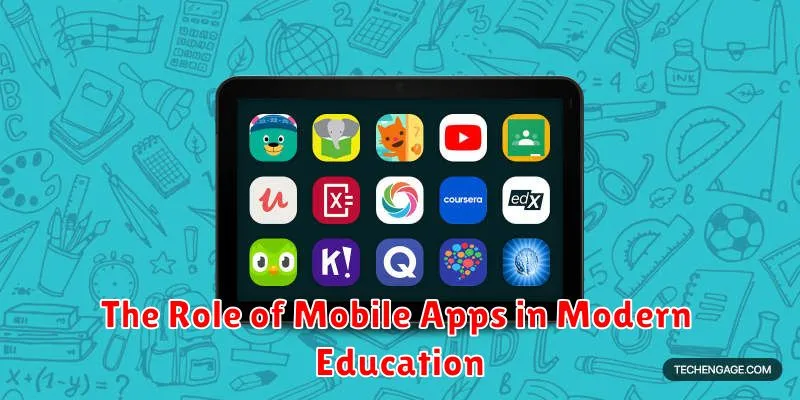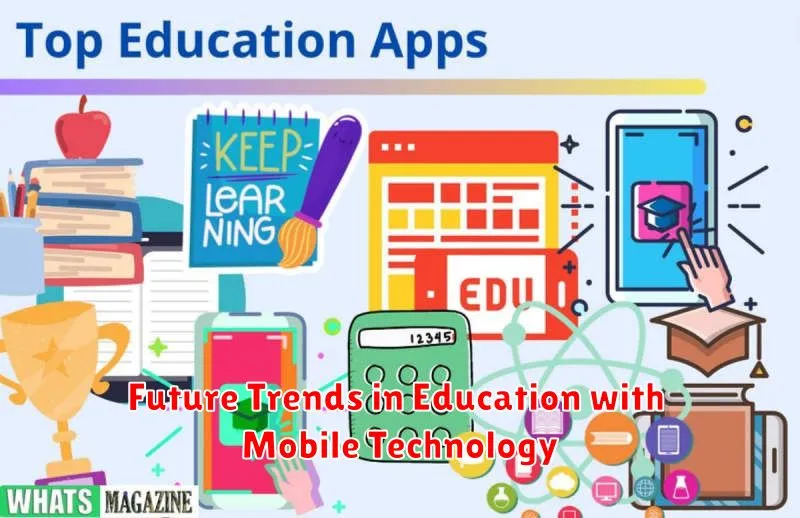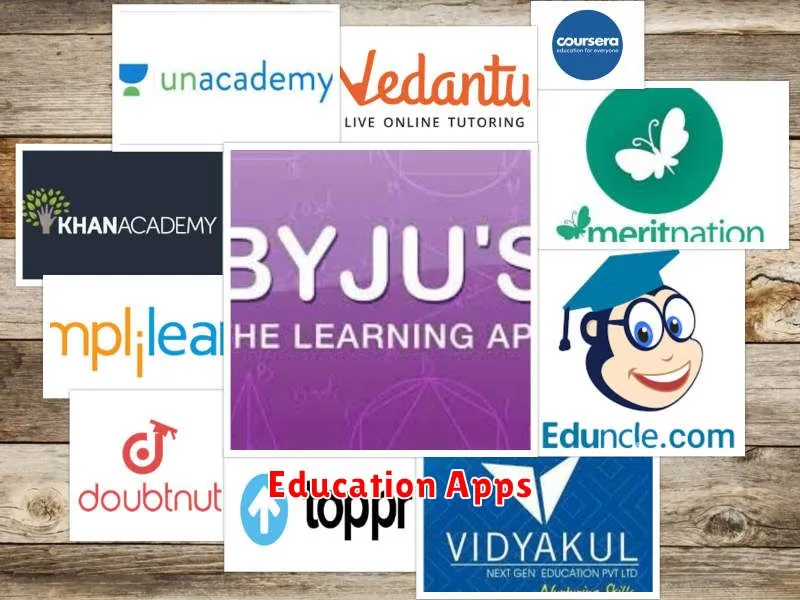The education industry is undergoing a massive transformation, thanks in part to the advent of mobile apps. These apps have revolutionized the way students learn, teachers teach, and institutions operate, making education more accessible, engaging, and effective than ever before. From interactive learning platforms to personalized study tools, mobile apps are empowering students to take control of their education and achieve their full potential.
Mobile apps have become an integral part of the modern educational landscape, offering a myriad of benefits for students, educators, and institutions alike. Interactive learning experiences, personalized learning pathways, and seamless access to educational resources are just a few of the ways mobile apps are enhancing the education industry.
The Role of Mobile Apps in Modern Education

Mobile apps have revolutionized the education industry, transforming the way students learn and educators teach. They offer a plethora of tools and resources that cater to diverse learning styles and enhance the overall educational experience. From interactive learning platforms to personalized learning tools, mobile apps are empowering students to take control of their education and educators to adapt to modern teaching methods.
One of the most significant roles of mobile apps in education is their ability to personalize learning. Students can access customized content and activities tailored to their individual needs and pace. Educational apps leverage adaptive learning technologies, which track student progress and adjust difficulty levels accordingly. This personalized approach ensures that students are constantly challenged and engaged, leading to improved comprehension and retention.
Moreover, mobile apps provide a platform for interactive learning. Games, simulations, and interactive exercises make learning fun and engaging. They encourage active participation and promote critical thinking skills. By gamifying educational content, mobile apps transform passive learning into an active and rewarding experience, motivating students to learn and explore.
Another crucial role of mobile apps is in facilitating communication between students, teachers, and parents. Apps can be used for real-time communication, homework assignments, progress tracking, and feedback sharing. This seamless communication streamlines the educational process and fosters a collaborative learning environment.
Furthermore, mobile apps provide access to a vast library of educational resources. Students can access textbooks, articles, videos, and other learning materials at their fingertips. This readily available information empowers students to learn independently and explore topics beyond the classroom curriculum. The convenience and accessibility of mobile learning apps contribute to a more flexible and engaging learning environment.
In conclusion, mobile apps have become an indispensable tool in modern education. Their ability to personalize learning, foster interactive engagement, facilitate communication, and provide access to educational resources has transformed the learning landscape. As technology continues to evolve, mobile apps will undoubtedly play an even greater role in shaping the future of education.
How AI is Transforming Educational Apps
Artificial intelligence (AI) is revolutionizing the education industry, particularly in the realm of mobile applications. Educational apps, powered by AI, are transforming the way students learn and educators teach, offering personalized learning experiences and efficient tools for managing education.
One of the most significant impacts of AI on educational apps is personalized learning. AI algorithms analyze student data, such as performance, learning pace, and interests, to create customized learning paths. These apps adapt to individual needs, providing targeted content and exercises to improve understanding and engagement. This personalized approach helps students learn at their own pace and address their specific learning gaps.
AI also empowers educators with intelligent tools for managing and enhancing teaching. AI-powered apps can automate tasks like grading, providing instant feedback, and identifying struggling students. These tools free up educators’ time, allowing them to focus on individualized instruction and provide personalized support to students who need it most.
Furthermore, AI is enabling innovative learning experiences within educational apps. AI-powered chatbots and virtual assistants provide real-time support and guidance to students, answering questions and providing explanations. Interactive simulations and virtual reality experiences create immersive learning environments that enhance understanding and retention.
The integration of AI in educational apps is transforming the education landscape, making learning more accessible, engaging, and effective. As AI technology continues to evolve, we can expect even more innovative and personalized learning experiences in the future.
Top Educational Apps for Students and Teachers
The education industry is constantly evolving, and mobile apps are playing a significant role in this transformation. Educational apps offer a plethora of benefits for both students and teachers, enhancing learning experiences and making education more accessible and engaging.
Here are some of the top educational apps for students and teachers:
For Students
- Khan Academy: A comprehensive platform that provides free educational videos, exercises, and practice problems covering a wide range of subjects.
- Duolingo: A popular language learning app that offers interactive lessons and gamified learning experiences.
- Quizlet: A versatile app that helps students learn and memorize information through flashcards, games, and quizzes.
- Evernote: A note-taking and organization app that allows students to capture ideas, organize notes, and collaborate with classmates.
- Chegg: An app that provides students with access to textbooks, solutions manuals, and expert tutoring services.
For Teachers
- Google Classroom: A free platform that allows teachers to create and manage assignments, provide feedback, and communicate with students.
- Edpuzzle: An app that enables teachers to create interactive video lessons, embed questions, and track student progress.
- Kahoot!: A gamified learning platform that allows teachers to create engaging quizzes and polls to assess student understanding.
- Nearpod: An interactive lesson platform that combines presentations, videos, and activities to create engaging and interactive learning experiences.
- ClassDojo: A classroom management app that helps teachers build a positive learning environment and communicate with parents.
These are just a few examples of the many educational apps available that can enhance the learning experience for students and teachers. By utilizing these apps, educators can create more engaging and interactive learning environments, while students can access a wealth of educational resources and support.
Challenges in Implementing Mobile Apps in Education
While mobile apps hold immense potential to revolutionize education, their implementation faces significant challenges. One key obstacle is access to technology. Not all students have reliable access to smartphones or tablets, creating a digital divide that hinders equitable learning. Additionally, cost can be a barrier, as schools and districts may lack the resources to purchase devices or cover data plans.
Another challenge lies in teacher training and support. Educators need proper training to effectively integrate apps into their curriculum and leverage their full potential. Furthermore, choosing the right apps can be daunting, as the abundance of options requires careful evaluation for quality, alignment with learning objectives, and suitability for various student needs.
Privacy and security concerns are paramount. Ensuring student data is protected and used responsibly is crucial. Schools and app developers must collaborate to implement robust privacy measures. Additionally, managing app usage within the classroom can be a challenge, as students may be distracted by non-educational apps or inappropriate content.
Finally, technological infrastructure must be robust enough to support large-scale app implementation. Reliable internet connectivity, compatible devices, and sufficient technical support are essential to ensure a smooth user experience.
Future Trends in Education with Mobile Technology

Mobile technology is transforming the education industry, offering new and innovative ways to learn and teach. The use of mobile apps has become increasingly popular, enabling students to access educational resources, engage in interactive learning activities, and communicate with their teachers and peers anytime, anywhere.
One of the key future trends in education with mobile technology is the rise of personalized learning. Mobile apps can track student progress and provide customized learning experiences based on their individual needs and learning styles. This personalized approach allows students to learn at their own pace and focus on areas where they need extra support.
Another emerging trend is the integration of augmented reality (AR) and virtual reality (VR) into mobile learning experiences. AR and VR technologies create immersive and engaging learning environments that can bring historical events, scientific concepts, or even distant locations to life. This can enhance student understanding and motivation.
Furthermore, gamification is being utilized to make learning more fun and engaging. Mobile apps can incorporate game mechanics such as points, badges, and leaderboards to encourage student participation and motivation. This gamified approach can help students develop essential skills such as problem-solving, critical thinking, and collaboration.
The future of education with mobile technology is bright. As technology continues to evolve, we can expect to see even more innovative mobile apps that enhance the learning process, personalize education, and prepare students for the challenges of the 21st century.
Case Studies: Successful Educational Apps
The education industry is rapidly evolving, and mobile apps are playing a crucial role in this transformation. With the increasing availability of smartphones and tablets, educational apps have become a popular and effective way for students to learn and teachers to engage their students. These apps provide a flexible and engaging learning experience, offering a wide range of benefits.
Here are some case studies of successful educational apps:
Duolingo
Duolingo is a popular language learning app that uses gamification techniques to make learning fun and engaging. It offers a variety of courses in different languages, and users can track their progress as they advance through the levels. Duolingo has been praised for its effective and engaging approach to language learning, and it has been downloaded over 500 million times.
Khan Academy
Khan Academy is a non-profit organization that provides free online courses in a wide range of subjects, including math, science, history, and more. The Khan Academy app offers a comprehensive learning experience, with video lessons, practice exercises, and personalized learning paths. The app has been used by millions of students worldwide, and it has been recognized for its high-quality educational content.
Quizlet
Quizlet is a study app that helps students learn and memorize information. The app allows users to create and share flashcards, study sets, and other learning tools. Quizlet has been used by millions of students to prepare for exams, and it has been praised for its effectiveness and ease of use.
These are just a few examples of successful educational apps that are transforming the education industry. These apps demonstrate the potential of mobile technology to create engaging and effective learning experiences for students of all ages.

